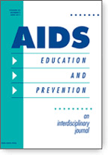
AIDS EDUCATION AND PREVENTION
Scope & Guideline
Connecting Research to Real-World Impact
Introduction
Aims and Scopes
- HIV Prevention Strategies:
The journal publishes research on innovative approaches to HIV prevention, including biomedical interventions like PrEP (pre-exposure prophylaxis) and behavioral interventions tailored for specific populations. - Health Disparities and Social Determinants:
A core focus is on understanding how social factors, including race, gender, and socioeconomic status, impact HIV risk and access to care, thereby informing targeted interventions. - Community Engagement and Behavioral Interventions:
Research highlighting community-based initiatives and participatory approaches that empower marginalized populations, especially sexual and gender minorities, in the fight against HIV. - Qualitative and Mixed-Methods Research:
The journal encourages the use of qualitative methodologies to gain insights into the lived experiences of individuals affected by HIV, enhancing the understanding of stigma, barriers, and facilitators to care. - Policy and Program Evaluation:
It addresses the evaluation of existing policies and programs aimed at HIV prevention and care, analyzing their effectiveness and suggesting improvements based on empirical evidence.
Trending and Emerging
- Technology-Enhanced Interventions:
There is a growing trend in utilizing technology, such as mobile health (mHealth) applications and telemedicine, to enhance access to HIV prevention and care services, especially during the COVID-19 pandemic. - Focus on Marginalized Populations:
Recent themes emphasize research targeting marginalized groups, including transgender individuals, young sexual minorities, and racial/ethnic minorities, addressing their unique barriers to care and prevention. - Integration of Mental Health and HIV Services:
Emerging research highlights the importance of integrating mental health support with HIV prevention and treatment services, recognizing the psychological aspects of living with HIV. - Behavioral Economics Approaches:
The application of behavioral economics, such as nudges and incentives, to improve adherence to HIV prevention methods, including PrEP, is increasingly being explored. - Community-Based Participatory Research (CBPR):
There is a rising emphasis on CBPR methodologies that involve community members in the research process, thereby ensuring that interventions are culturally relevant and effective.
Declining or Waning
- Traditional HIV Prevention Methods:
There seems to be a decline in research focused solely on traditional prevention methods, such as condom use promotion, as newer biomedical strategies like PrEP and long-acting injectable therapies gain prominence. - Generalized HIV Awareness Campaigns:
Studies focusing on broad awareness campaigns without specific targeting of high-risk populations are becoming less common, as the journal emphasizes more tailored and context-specific approaches. - Static Models of Care:
Research on static models of HIV care delivery is waning, with a shift towards dynamic, integrated care approaches that consider the evolving needs of diverse populations.
Similar Journals

HIV Research & Clinical Practice
Connecting research and clinical excellence in HIV.HIV Research & Clinical Practice, published by Taylor & Francis Ltd, is an essential open-access journal dedicated to advancing the knowledge and understanding of HIV-related research and clinical practices. With an ISSN of 2578-7489 and E-ISSN 2578-7470, this acclaimed journal is committed to disseminating cutting-edge studies and innovative treatment strategies within the infectious diseases and pharmacology fields, achieving a commendable Q2 ranking in both categories as of 2023. The journal's scope encompasses a broad range of topics from basic science to clinical application, providing a vital platform for researchers, clinicians, and students to exchange insights and foster collaboration. As an open-access publication since 2022, it ensures that high-quality research is accessible to a global audience, encouraging a greater understanding of HIV and its implications for public health. With its base in the United Kingdom and a convergence period from 2019 to 2024, HIV Research & Clinical Practice stands at the forefront of the fight against HIV/AIDS, making significant contributions to the clinical community and beyond.

Journal of Health Research
Championing interdisciplinary collaboration in health policy.Welcome to the Journal of Health Research, an esteemed publication in the field of health policy and public health, published by COLL PUBLIC HEALTH SCIENCES at Chulalongkorn University, Thailand. With an E-ISSN of 2586-940X and an ISSN of 0857-4421, this open access journal has been dedicated to advancing scholarship since its transition to open access in 2018. The journal serves as a vital platform for disseminating high-quality research that addresses pressing health issues within both local and global contexts. It currently holds a Q3 rating in the categories of Health Policy and Public Health according to the 2023 Quartiles, and is ranked #395 in Public Health and #186 in Health Policy out of their respective categories on Scopus. With a commitment to fostering innovative approaches and interdisciplinary collaboration, the Journal of Health Research invites researchers, professionals, and students alike to contribute and engage in critical discussions that further the public health narrative.

Sexual and Reproductive Health Matters
Connecting researchers to improve sexual health outcomes.Sexual and Reproductive Health Matters is an esteemed open-access journal published by Taylor & Francis Ltd, dedicated to advancing the fields of obstetrics and gynecology as well as reproductive medicine. Since its transition to open access in 2019, the journal has provided a vital platform for disseminating cutting-edge research and innovative practices pertaining to sexual and reproductive health. With a commendable impact reflected by its categorization in the Q1 Quartile for both Obstetrics and Gynecology and Reproductive Medicine as per the 2023 rankings, it ranks prominently at #71 out of 209 in Obstetrics and Gynecology and #34 out of 90 in Reproductive Medicine on Scopus. This journal not only serves as a resource for researchers and practitioners in the United Kingdom but also has a global reach, inviting contributions that address critical issues related to sexual and reproductive health. Positioned at the forefront of current health science discourse, Sexual and Reproductive Health Matters is an essential read for anyone dedicated to improving health outcomes in this vital area.
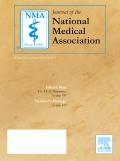
JOURNAL OF THE NATIONAL MEDICAL ASSOCIATION
Transforming Healthcare Through Quality PublicationThe JOURNAL OF THE NATIONAL MEDICAL ASSOCIATION, published by the NATL MED ASSOC, stands as a premier platform in the realm of medical research and discourse, with a rich history spanning from 1946 to 2024. With an impressive Q1 ranking in the field of Medicine (miscellaneous), this journal is dedicated to advancing knowledge across diverse subfields of medicine, making it a critical resource for researchers, practitioners, and students alike. Recognized for its significant impact, it holds a commendable position within the 83rd percentile of general medicine publications, ranked at #106 out of 636 by Scopus. Although currently lacking open access options, the journal continues to disseminate foundational research and innovative insights essential for driving progress in healthcare. Its commitment to quality publication reflects the high standards of the National Medical Association, ensuring that each article contributes meaningfully to the global healthcare community.

Journal of Primary Prevention
Elevating Public Health Through Primary PreventionJournal of Primary Prevention is a pivotal publication in the field of public health, specifically dedicated to advancing the understanding and application of primary prevention strategies. Published by Springer, this journal offers a comprehensive platform for researchers, professionals, and students to disseminate innovative findings and effective practices that aim to preempt the onset of diseases and health disparities. With an ISSN of 0278-095X and an E-ISSN of 1573-6547, it provides valuable insights into environmental and occupational health along with general medicine. Although coverage has been discontinued in Scopus since 2022, the journal continues to hold significant relevance, maintaining a respectable rank of #265/562 within the public health category. Researchers interested in promoting health at both individual and community levels will find this journal a vital resource for timely articles and evidence-based research. Open access options allow for greater dissemination of knowledge, ensuring that critical information reaches a broader audience committed to fostering healthier communities.
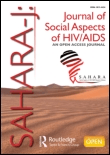
Sahara J-Journal of Social Aspects of HIV-AIDS
Illuminating the Intersection of Society and HIV/AIDSSahara J-Journal of Social Aspects of HIV-AIDS, published by TAYLOR & FRANCIS LTD, is a distinguished open-access journal that has been contributing to the discourse surrounding HIV/AIDS since its inception in 2004. Operating from the United Kingdom, this journal aims to provide a comprehensive platform for researchers, professionals, and students to explore the social dimensions of HIV/AIDS, fostering an understanding of its impact on health, public policy, and societal norms. With an increasing impact factor and ranking within the Q3 category across various health-related fields, including Social Sciences, Infectious Diseases, and Public Health, Sahara J serves as a vital resource for interdisciplinary studies. Its commitment to open-access publishing ensures that vital research findings are freely available to a global audience, promoting widespread dissemination of knowledge and ultimately enhancing collaborative efforts to address the ongoing challenges posed by HIV/AIDS. As we navigate a rapidly evolving landscape in public health, this journal remains dedicated to advancing critical insights and fostering informed dialogues within the academic community.

JOURNAL OF BEHAVIORAL HEALTH SERVICES & RESEARCH
Exploring the intersection of policy and public health.JOURNAL OF BEHAVIORAL HEALTH SERVICES & RESEARCH, published by Springer, is a premier peer-reviewed journal dedicated to advancing the scientific understanding of behavioral health services and their impact on individuals and communities. With its esteemed standing in the academic realm, as demonstrated by its Q1 ranking across multiple categories including Health Policy and Public Health in 2023, this journal offers vital insights into the intricacies of health service delivery, policy innovation, and the social determinants of health.
Since its inception in 1996, the journal has played a crucial role in disseminating high-quality research that addresses the evolving challenges in health services, and is uniquely positioned to contribute to the evidence-based advancements in this field through its valuable contributions and a growing repository of knowledge. Researchers, professionals, and students can benefit from both open access options and a subscription model to stay abreast of transformative trends and empirical evidence shaping behavioral health services.
As it continues to converge into the future, this journal remains a vital platform for those committed to enhancing the effectiveness of health services and promoting significant improvements in health outcomes across diverse populations.
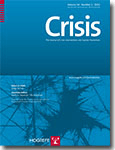
Crisis-The Journal of Crisis Intervention and Suicide Prevention
Advancing Mental Health Solutions Through ResearchCrisis - The Journal of Crisis Intervention and Suicide Prevention is a leading publication in the field of Psychiatry and Mental Health, dedicated to advancing the understanding and practice of crisis intervention and suicide prevention strategies. Published by HOGREFE PUBLISHING CORP in the United States, the journal has been a vital resource for researchers, practitioners, and students since its inception in 1985. With a focus on evidence-based approaches, the journal aims to disseminate influential research findings, case studies, and innovative practices within the realm of crisis management. Despite being classified in the Q3 category of psychiatry and mental health, it holds a commendable rank of #190 out of 567 in Scopus, placing it in the 66th percentile, which underscores its relevance and impact in the academic community. This journal serves as a crucial platform for multidisciplinary dialogue and offers valuable insights into improving mental health outcomes and crisis response strategies.
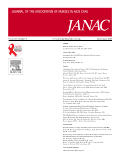
JANAC-JOURNAL OF THE ASSOCIATION OF NURSES IN AIDS CARE
Elevating Nursing Practices in HIV/AIDS ManagementJANAC - Journal of the Association of Nurses in AIDS Care is a premier peer-reviewed publication dedicated to the advancement of knowledge and practice in the field of AIDS nursing. Published by the esteemed Lippincott Williams & Wilkins, this journal has established itself as a crucial resource for researchers, clinicians, and educators since its inception in 1991. With an impressive Q1 ranking in Advanced and Specialized Nursing and a Scopus rank of 14 out of 63, JANAC stands at the forefront of scholarly communication, reflecting its high impact and relevance in the nursing community. The journal aims to disseminate groundbreaking research, innovative practices, and comprehensive reviews that address the unique challenges faced in AIDS care, making it an indispensable tool for those committed to improving health outcomes for individuals affected by HIV/AIDS. While not an Open Access journal, JANAC continues to foster knowledge exchange through its rigorous editorial process and diverse publication options, ensuring that important findings reach practitioners and policymakers alike.
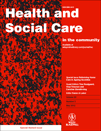
HEALTH & SOCIAL CARE IN THE COMMUNITY
Championing evidence-based practices in health and social care.HEALTH & SOCIAL CARE IN THE COMMUNITY, published by WILEY-HINDAWI, is a prominent journal in the fields of health policy, public health, social sciences, and social work, reflecting its broad academic appeal and comprehensive scope. With an impressive categorization in Q1 for Sociology and Political Science and Q2 rankings across various health-related fields, the journal serves as a vital resource for researchers, practitioners, and students dedicated to advancing knowledge in health and social care domains. Since its inception in 1993, it has consistently promoted high-quality, peer-reviewed articles that tackle contemporary issues, ensuring its relevance and impact in our rapidly evolving society. While the journal is accessible through subscription, it stands out for its commitment to disseminating crucial research findings which are pivotal to establishing effective practices and policies in health and social care. As it approaches its convergence into 2024, the journal continues to be a key player in supporting interdisciplinary dialogue and fostering research that influences real-world change.